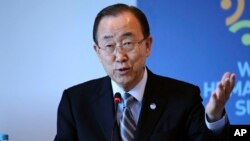A diplomatic feud between Saudi Arabia and U.N. Secretary-General Ban Ki-moon is escalating. The U.N. chief says the kingdom pressured him into removing the Saudi coalition in Yemen from a blacklist of entitites that harm children during conflicts.
“It is unacceptable for member states to exert undue pressure,” Ban told reporters Thursday, in reference to the U.N. report published earlier this week that listed the Saudi Arabia-led coalition as one of the parties that “kill and maim children” and “engage in attacks on schools and/or hospitals.”
Annual blacklist
The Saudis were quick to admonish the United Nations for putting them and their allies on the annual blacklist that includes shady governments such as Bashar al-Assad’s in Syria and Omar al-Bashir’s in Sudan and the Islamic State terror group.
Credible reports surfaced that the Saudis and other coalition members threatened to pull their funding from U.N. agencies and humanitarian operations if they were not de-listed, a move that could cripple already cash-strapped life-saving programs, including many serving Arabs and Muslims.
Ban appeared to confirm those reports Thursday, telling reporters, “I also had to consider the very real prospect that millions of other children would suffer grievously if, as was suggested to me, countries would de-fund many U.N. programs.”
Horrors children face
The U.N. chief said the report on children in armed conflict described “horrors no child should have to face” in Yemen and that it was “one of the most painful and difficult decisions I have had to make” in removing the coalition from the black list. But he insisted the United Nations stands by the report and will not change its content.
Saudi Ambassador Abdallah al-Mouallimi strongly rejected characterizations that his government had extorted the secretary-general into removing them from the list.
Ban took the coalition off the list on Monday. The U.N. says the removal is pending a review and further consultations with Riyadh; the Saudis have said it is permanent.
“I want to reassure you,” the Saudi envoy told reporters, “it is not in our style, it is not in our genes, it is not in our culture, to use threats and intimidation.” He added, “We did not exercise pressure or intimidation. We made our point clear; we made it firmly.”
Saudi removal, pending review
The Saudis and other Gulf Arab members of the coalition that are fighting Iranian-backed Shi’ite Houthi rebels in Yemen donate hundreds of millions of dollars to U.N. programs, including UNRWA which assists Palestinian refugees and UNICEF. Saudi Arabia is also the third biggest funder of the U.N. humanitarian appeal for Yemen, having pledged more than $46 million for 2016.
The report says that nearly 2,000 Yemeni children were killed or injured in 2015, and attributed 60 percent of those casualties to the Saudi-led coalition. The Saudi envoy has called that figure “wildly inaccurate.” The United nations also says that of the 101 verified attacks on schools and hospitals, the Saudi-led coalition is responsible for nearly half.
The Children in Armed Conflict Report often irritates governments that are included in it. Last year, the U.N. found itself in a similar situation, as it sought to list Israel for the deaths of nearly 500 Palestinian children in the Gaza war of 2014. Israel succeeded in preventing having its name added to the blacklist before the report’s publication, but was roundly criticized by human rights and Arab groups.






